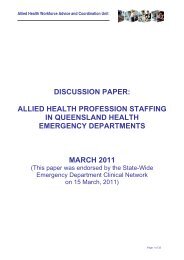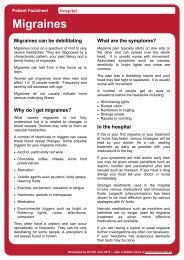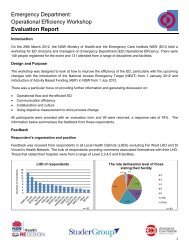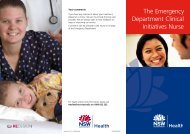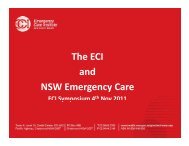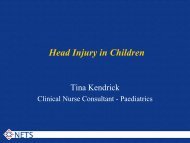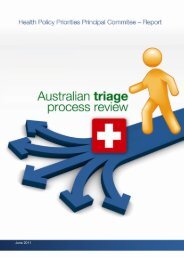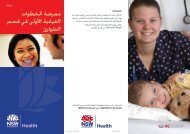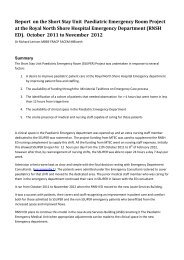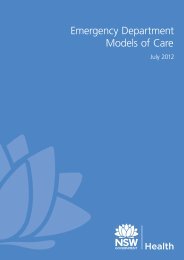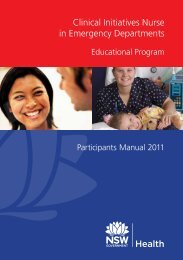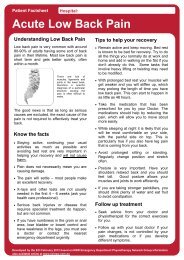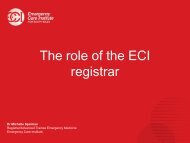Facilitators Manual - Emergency Care Institute
Facilitators Manual - Emergency Care Institute
Facilitators Manual - Emergency Care Institute
Create successful ePaper yourself
Turn your PDF publications into a flip-book with our unique Google optimized e-Paper software.
Team approach to clinical supportTo maintain high quality healthcare that is delivered with compassion, attention to detail and clinicalexcellence there is a need to ensure that junior staff are adequately supervised, supported anddeveloped.As nurses work within a team, it is an expectation that team members support them as they developthe confidence and competence required to practice independently.Participants are allocated a support person to mentor and precept (in addition to the Program Facilitator)them through their professional adjustment and skill acquisition.A ‘support person’ is to be a senior registered nurse with the capability of assessing the participant inthe absence of the Clinical Nurse Educator (CNE) or Program Facilitator. Together with the ProgramFacilitator, the support person is expected to guide participants learning and assist them in completingthe learning activities. Support persons may be a registered nurse, Clinical Nurse Consultant, NursePractitioner, Clinical Nurse Specialist or Nurse Educator.Ensuring that the participant has an effective support network is integral to achieving the desiredProgram outcomes. The NUM plays a pivotal leadership role in developing a supportive clinicalculture where experienced and senior staff act as role models, facilitating learning with new, junioror inexperienced staff 7 .OrientationAll participants are expected to attend and complete the mandatory requirements of corporate,nursing and emergency department orientation.7Clinical experience: Recognition of prior learningWhat is Recognition?Recognition is a term that covers Recognition of Prior Learning, Recognition of Current Competencyand Skills Recognition. All terms refer to the recognition of competencies currently held, regardless ofhow, when or where the learning occurred.This includes:• Any combination of formal or informal training and education (tertiary studies or workplace training)• Work experience, life experience or community work.Why apply for Recognition?Recognition allows the nurse to gain credit for units of competency by recognising the knowledge andskills already gained without repeating or undertaking unnecessary training.Application for Recognition• The nurse compiles evidence according to the guidelines provided. You may need to offer guidanceand support to the nurse to put the application together.• Recognition Application submitted to educator.• Educator reviews the application and notifies the nurse of the outcome of Recognition Applicationapproximately 2 weeks after submission.• You may request the nurse to provide further evidence and/or attend an interview for clarificationand/or validation of the evidence provided.• If the application successfully meets all the requirements of the Transition to <strong>Emergency</strong> NursingProgram the nurse may be awarded recognition of prior learning for relevant program components.7Benchmark for Learning and Development Culture; Essentials of <strong>Care</strong>, point 3 (2009)



